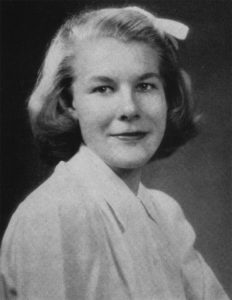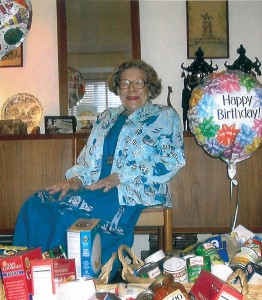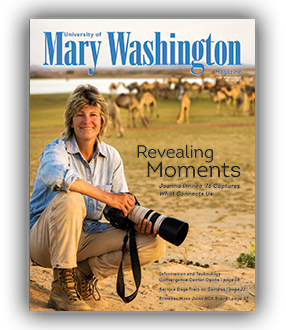
Mary Washington senior Lois Loehr in the 1941 Battlefield yearbook.
Lois Loehr Brown ’41 couldn’t have articulated exactly what she felt the spring she graduated from Mary Washington. But she would carry the buoyant feeling with her when she interviewed for – and landed – her first teaching job in Middlesex County, Virginia, that autumn. Brown possessed it when, after moving to Detroit with her young family after World War II, she was required to take a speech class so the locals could understand her. And she carried it with her on solo travels all over the world – including East Africa, Israel, China, and the Soviet Union.
“I didn’t realize at the time, but when I came out of Mary Washington, I felt confidence,” said Brown, 95, a longtime class agent who lives in Annandale, Virginia.
The great-granddaughter of Prussian immigrants and the granddaughter of a Confederate soldier, Brown grew up in the shadow of Robert E. Lee’s bronze likeness in Richmond. She headed to Fredericksburg in the fall of 1937 to pursue a degree in physical education.
“The rules were fascinating. If we wanted to go downtown, we had to wear stockings, which had seams up the back. If we didn’t want to wear them, we took a pencil and made a seam,” she said. Socializing with the opposite sex was strictly monitored. “You could not just have anybody come and date you.”
Nina Bushnell, the often-remembered dean of women, kept a list of preapproved names. “The boy would report to her, and you would be summoned.”
Brown’s classmates were Fauquier County farm girls and aspiring movie stars from California, and she kept in touch with many of them for the rest of their lives. The same went for educators: Dean Edward Alvey, who wrote beautiful letters of recommendation; Professor William McDermott, who taught her to play cribbage; and biology professor Hugo Iltis, who answered her questions when Brown became an educator herself.
“I didn’t realize at the time, but when I came out of Mary Washington, I felt confidence.” – Lois Loehr Brown
There was President Morgan Combs who, Brown remembered, “was not a friendly man at all but a great politician.”

Lois Loehr Brown collected 92 pounds of food for the hungry for her 92nd birthday.
In a bid for a new library, Combs summoned all the students into the outdated one before inviting the governor in. “We were sitting on the floors, on the windowsills. He said, ‘See, we need money for a library.’ ”
As a young teacher, Brown moved her desk from the front of the room to the back to encourage students’ independence. She would clear the furniture, put on a record, and encourage doctors’ daughters to dance with watermen’s sons.
In 1957, a year after earning a master’s degree from the University of Virginia, Brown became a special education teacher when the concept was mostly unknown. Her first orders of business: replacing craft-making materials with books and arranging for her students to take the regular bus with everyone else.
She went head-to-head with a superintendent for a storm fence near a ravine that backed against the playground. And she stood up to administrators who tried to place normal-ability students in her class when other teachers couldn’t handle their behavioral problems.
Perhaps, Brown said, she was born with the fearlessness and creativity that took her through a 30-year career in education and beyond. But at Mary Washington, those qualities blossomed.
